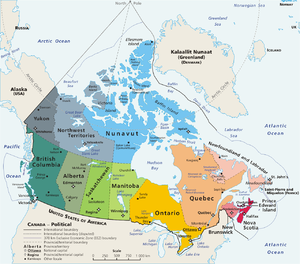Canadian geography
 |
|
| Continent | North America |
|---|---|
| Region | Northern America |
| Coordinates | 60°00′N 95°00′W / 60.000°N 95.000°W |
| Area | Ranked 2nd |
| • Total | 9,984,671 km2 (3,855,103 sq mi) |
| • Land | 91.08% |
| • Water | 8.92% |
| Coastline | 202,080 km (125,570 mi) |
| Borders | 8,893 km |
| Highest point |
Mount Logan, 5,959 m (19,551 ft) |
| Lowest point | Atlantic Ocean, Sea Level |
| Longest river |
Mackenzie River, 4,241 km (2,635 mi) |
| Largest lake |
Great Bear Lake 31,153 km2 (12,028 sq mi) |
| Climate | temperate in south to subarctic or arctic in north |
| Terrain | mostly plains with mountains in west and lowlands in southeast |
| Natural Resources | iron ore, nickel, zinc, copper, gold, lead, molybdenum, potash, diamonds, silver, fish, timber, wildlife, coal, petroleum, natural gas, hydropower |
| Natural Hazards | permafrost, cyclonic storms, tornadoes, forest fires |
| Environmental Issues | air and water pollution, acid rains |
The geography of Canada describes the geographic features of Canada, the world's second largest country in total area.
Situated in northern North America (constituting 41% of the continent's area), Canada spans a vast, diverse territory between the North Pacific Ocean to the west and the North Atlantic Ocean to the east and the Arctic Ocean to the north (hence the country's motto "From sea to sea"), with the United States to the south (contiguous United States) and northwest (Alaska). Greenland is to the northeast; off the southern coast of Newfoundland lies Saint-Pierre and Miquelon, an overseas collectivity of France. Since 1925, Canada has claimed the portion of the Arctic between 60°W and 141°W longitude to the North Pole; however, this claim is contested. While the magnetic North Pole lies within the Canadian Arctic territorial claim as of 2011, recent measurements indicate it is moving towards Siberia.
Covering 9,984,670 km2 or 3,855,100 sq mi (land: 9,093,507 km2 or 3,511,023 sq mi; freshwater: 891,163 km2 or 344,080 sq mi), Canada is slightly less than three-fifths as large as Russia and slightly smaller than Europe. In total area, Canada is slightly larger than both the U.S. and China; however, Canada ranks fourth in land area (i.e. total area minus the area of lakes and rivers)—China is 9,326,410 km2 (3,600,950 sq mi) and the U.S. is 9,161,923 km2 (3,537,438 sq mi).
...
Wikipedia
